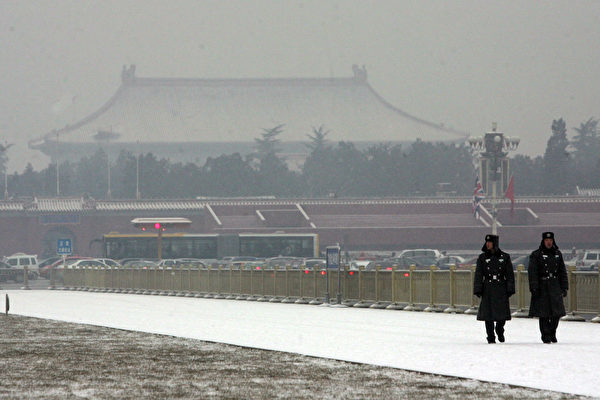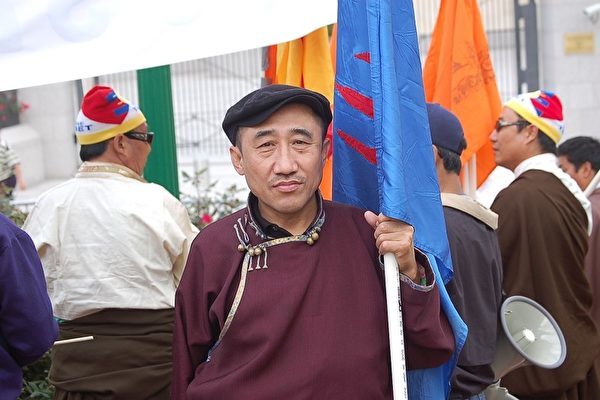Chinese paramilitary police stand guard at Tiananmen Square. (China Photos/Getty Images)
[People News] On August 26, Chinese state media People’s Daily published an article titled “Xi Jinping Meets with Vyacheslav Volodin, Chairman of the Russian State Duma”, reporting that Xi met Volodin at the Great Hall of the People in Beijing that morning.
Strangely, however, on the same day, Russia’s Sputnik News published “Russian Duma Chairman Pays Tribute to Chinese People: Thank You for Safeguarding History”, stating that Volodin was already in Changchun on August 26. This means his meeting with Xi Jinping actually took place on August 25.
1. Could the Russia–Ukraine war be nearing its end? Russia shifts focus to Northeast China
On August 26, while meeting Huang Qiang, Communist Party Secretary of Jilin Province and Director of the Standing Committee of the Jilin Provincial People’s Congress, Volodin stressed that cooperation between Russian and Chinese regions should be based on principles of good-neighborliness and friendship.
Volodin said: “Jilin Province holds special importance for developing bilateral relations. It borders Russia’s Primorsky Krai. Naturally, based on the principle of good-neighborliness, we should fully utilize the 250 km (in reality, 246 km) shared border. Building on the existing foundation of relations between our two countries, we can do much to advance regional cooperation in various forms.”
This statement was not disclosed by Beijing.
Russian video footage showed Volodin making only a few remarks, stating that the Soviet Union and the Chinese people made great contributions to defeating fascism, and that Russia wished to celebrate this hard-won victory together with China in memory of the fallen.
On August 25, Volodin met Xi Jinping and Zhao Leji in Beijing. The Russian Federation Council and China’s National People’s Congress also held the 10th session of the Interparliamentary Cooperation Committee.
2. Xi Jinping seeks tighter binding with Russia
According to Xinhua, Xi emphasized that inter-parliamentary cooperation is an indispensable component of the “comprehensive strategic partnership of coordination for a new era” between China and Russia. He expressed hope that both sides would actively exchange governance and legislative experience, thereby providing stronger legal guarantees for strategic coordination and cooperation under the new circumstances.
China stresses that the two countries are “strategic partners,” not “allies.” The key difference is that alliances are bound by formal treaties or agreements. Hence, legislative cooperation between the two countries becomes highly significant.
3. Xi Jinping’s “Huang Silang–style” manipulation leaves Zhao Leji trapped
During the 2025 “Two Sessions,” Zhao Leji was absent from the closing ceremony of the National People’s Congress. Rumors suggest that Zhao’s absence was due to Xi Jinping pressuring the legislature to pass a China–Russia strategic cooperation agreement. Zhao reportedly feared that if Russia were defeated, he might ultimately be scapegoated for Xi’s decision.
Since becoming Chairman of the NPC Standing Committee in 2023, Zhao has overseen exchanges between Chinese and Russian legislatures.
From 2023 onward, contacts between the two parliaments have intensified. Zhao has repeatedly met with Volodin, affirming that China and Russia are “comprehensive strategic partners for a new era,” supporting inter-parliamentary legislative exchanges and mechanisms—fully aligned with Beijing’s official stance: “China and Russia are not allies, do not target third parties, but cooperation has no limits; they oppose hegemony and unilateral sanctions.”
On August 25, Volodin met Zhao separately to further discuss legislative matters.
By nature of his position and his own statements, Zhao Leji has already walked into a trap Xi set for him. Recent People’s Daily coverage of Zhao may be Xi’s way of enticing him to willingly accept the shackles.
Previously, rumors circulated that Wang Lixia, former Chairman of Inner Mongolia, was Zhao’s mistress. Her downfall could drag Zhao down as well. Wang offended Hu Chunhua while working on the “20-year retrospective investigation” in Inner Mongolia. If rumors that Hu Chunhua is slated to succeed Xi prove true, Wang’s fall would be inevitable.
Earlier, Luo Yulin, a protégé Zhao cultivated in Qinghai, “committed suicide” in prison. Several of Zhao’s associates in Shaanxi also fell, including former Governor Zhao Zhengyong, Standing Committee member Wei Minzhou, Deputy Secretary of the Political and Legal Committee Wu Xincheng, Vice Governor Feng Xinzhu, Standing Committee Secretary-General Qian Yin’an, Vice Governor Chen Guoqiang, and Vice Chairman of the Provincial CPPCC Zhu Zuoli. Combined with Wang Lixia’s collapse, Zhao Leji is now cornered.
Xi Jinping governs through a mixture of reward and coercion. This time he applied his “Huang Silang–style” tactic on Zhao: invite to the table, then offer a choice between “beheading” or “becoming a dog.” The banquet has been served—whether Zhao is “executed” or “domesticated” is now his own choice.
4. Zhang Youxia pledges loyalty to Xi Jinping?
Some media claim Zhang Youxia recently made a public show of loyalty to Xi, insisting there has never been any real struggle between them. But if the military were truly harmonious, why has the commander-in-chief of the 2023 “93rd anniversary” parade not been announced? Why has Xi’s trusted 31st Group Army been wiped out? Why are so many senior officers missing? Why was the traditional August 1 conferment of ranks absent?
Radio France Internationale published an article titled “Zhang Youxia: Truly Study, Truly Understand, Truly Believe, and Truly Apply Xi Jinping Thought on a Strong Military in the New Era—Comprehensively Strengthen Training and Readiness”. This raises the question: had he previously not “truly studied, understood, believed, or applied” it?
Zhang stressed: “We must always remember that only a strong military can ensure national security. We must accelerate modernization of national defense and the armed forces, defend the hard-won fruits of peace and justice, adhere to the correct view of World War II history, safeguard the postwar international order, actively promote building a community with a shared future for mankind, and always be a firm force for world peace.”
Yet WWII history is universally recognized, not subject to Beijing’s one-sided narrative. Moreover, regarding Taiwan, U.S. documents after WWII made its status clear.
On June 27, 1950, after the Korean War broke out, U.S. President Truman issued the Taiwan Strait Neutrality Statement, declaring that the status of Taiwan and Penghu was undetermined. On December 2, 1954, the U.S. signed the Sino-American Mutual Defense Treaty with the Nationalist government, recognizing it as China’s representative in exile. The treaty’s defensive scope included Taiwan, Penghu, as well as Kinmen and Matsu. It took effect on March 3, 1955, and was terminated on January 1, 1980. Crucially, the U.S. clarified that the treaty did not alter Chiang Kai-shek’s claim of sovereignty over “Formosa.”
The name Formosa (Portuguese for “beautiful island”) was used because Taiwan had changed hands many times—ruled by the Dutch, Spanish, the Zheng regime, Qing dynasty, and Japan—before coming under the Republic of China.
So, does Zhang Youxia accept Taiwan’s independence, or does he recognize that the U.S. left its status unresolved? How Beijing interprets this history remains unclear.
If Zhang bows his head to Xi Jinping, his fate may mirror Zhao Leji’s: should military action be launched against Taiwan, the blame will fall squarely on Zhang’s shoulders.










News magazine bootstrap themes!
I like this themes, fast loading and look profesional
Thank you Carlos!
You're welcome!
Please support me with give positive rating!
Yes Sure!